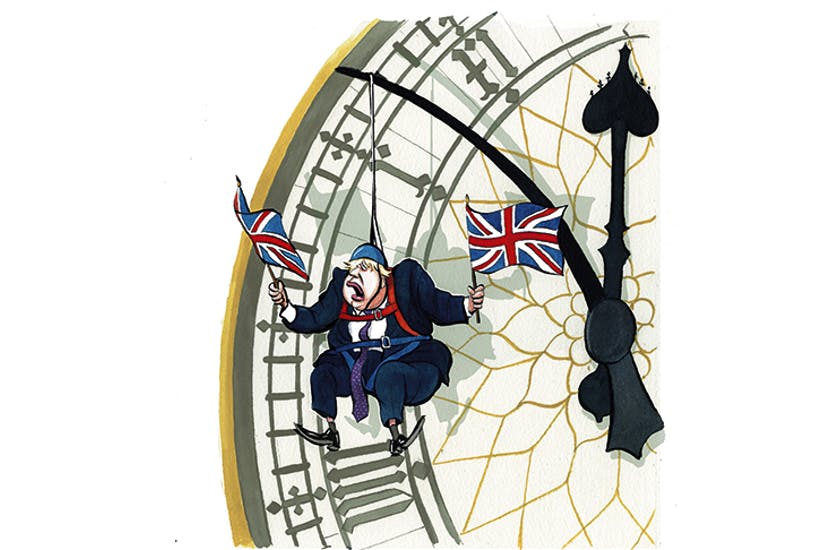Much of the nation breathed a sigh of relief when the exit poll was released. Whatever one’s views of the Tories, their clear majority has at least saved the country from yet more years of argument and damaging uncertainty. All the other major parties were committed to overturning the result of the 2016 referendum. At heart, the election outcome was a validation of democracy: voters do not like the sight of politicians ignoring their clear instructions that the UK must leave the EU.
But despite the emphatic result, it did not take long for some to try to reframe the debate in a pro-remain direction. Boris, we were told, could use his large majority to pivot to a “softer Brexit”. Indeed, this is the eager expectation of some on the EU negotiating side.
‘Softer Brexit’ is code for long term commitments to align the UK with EU regulations and, if at all possible, tariffs. In other words, instead of Brexit meaning that the UK retakes democratic control over its laws and economic policy, it would mean the UK ceding control over these matters to a foreign power, while giving up any say over how that power takes decisions.
Possibly this is a case of a London-centric establishment too blinkered to understand that voters see Brexit as an opportunity to be grasped, not a disaster to be managed. But it could also be viewed as a deliberate strategy to ensure that, even though Brexit cannot now be stopped from happening, it happens in name only.
It is not hard to see how such a strategy might play out: encourage the EU not to agree a trade deal unless the UK agrees to commit to staying within the EU’s regulatory orbit; put pressure on the UK side by resurrecting project fear should we end up leaving without a trade deal a year from now; frame the debate so that a transition extension is seen as the only way of avoiding economic disaster and hope that Boris ends up settling for a half-baked compromise that neuters any significant changes arising from Brexit.
Aside from the democratic deficit inherent in such an approach, an underlying assumption is that the looser our arrangement with the EU, the worse things will be for British business.
This assumption may be widespread but it is also wrong. In fact, there is a clear trade-off for the economy. Closer ties with the EU, of course, makes things easy for many business who trade intensively with the EU.
On the other hand, too strong a commitment to following EU rules could make other important trade deals difficult or even impossible to achieve, with the result that businesses wanting to develop better links with faster growing parts of the world outside the EU continue to suffer.
All trade deals involves some level of agreement over common standards but this does not have to mean the UK continuing to follow every EU regulation or, indeed, the heavy-handed EU approach to regulatory compliance.
The experience of EU trade deals with other countries, such as Canada, are evidence that it is quite possible for the UK both to have continued free trade with the EU, but also to retain the freedom to decide our own trade policy with other countries.
To achieve this, Boris would have to demonstrate that he is willing to use his majority to keep open the option of the UK ending transition with either a bare-bones EU-UK trade deal or, if needs be, no trade deal at all. As with any negotiation, if the exit strategy is not seen as credible, your chances of achieving a good outcome are diminished.
The announcement that the Government will change the law to rule out any extension to the transition period is a good start. Of course, there would be nothing to stop the Government introducing another law to reverse this later in the year. So to ensure this commitment is credible, Boris should consider following Andrew Lilico’s suggestion that he makes it a priority to agree trade deals with non-EU countries such as New Zealand and Australia at an early stage of EU-UK negotiations. This would effectively rule out the UK agreeing to stay fully within the EU’s regulatory orbit or to any form of EU customs union.
Such a strategy would make it much more likely that the EU will agree to a sensible free trade agreement by December 2020. Given the £66 billion trade surplus that the EU operates with the UK, they will have every incentive to do so.
But in the end, it takes two to tango and no-one can force the EU to complete a trade deal with the UK. If Boris gets sucked into the vortex in which such an outcome is accepted as being unthinkable, he will quickly find himself in the same situation as Theresa May, forced to choose between an unsatisfactory compromise and ever more dither and delay.
Boris and his advisors know that newly-won voters in leave-leaning constituencies across the country would be unlikely to forgive such an outcome. As a result, it is hard to see the Government falling for the “soft Brexit” snake oil yet again.
David Paton is professor of industrial economics at Nottingham University Business School. He tweets at @cricketwyvern






Comments